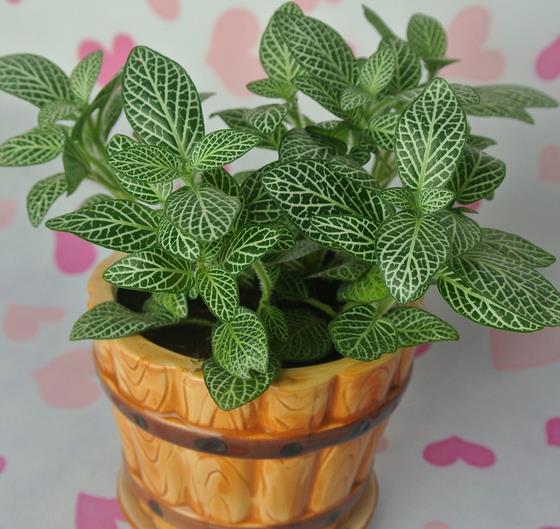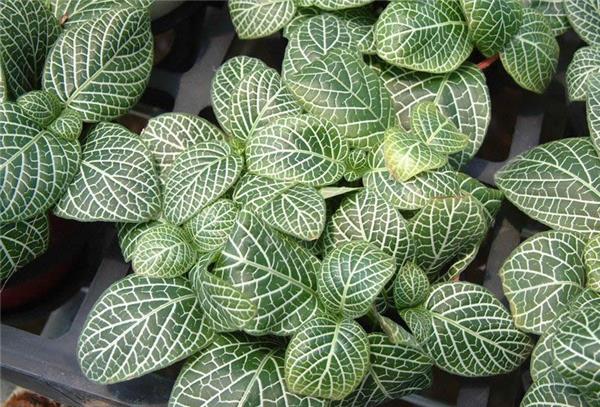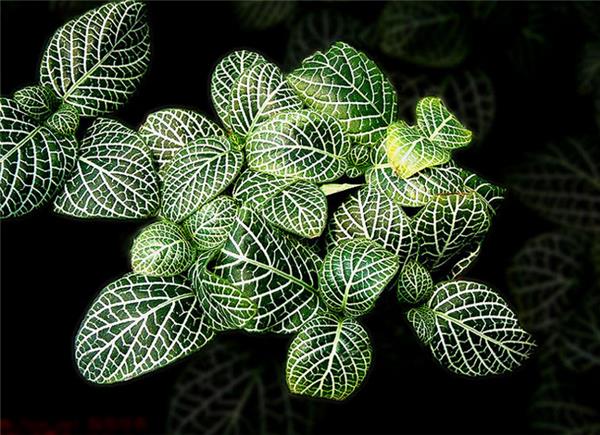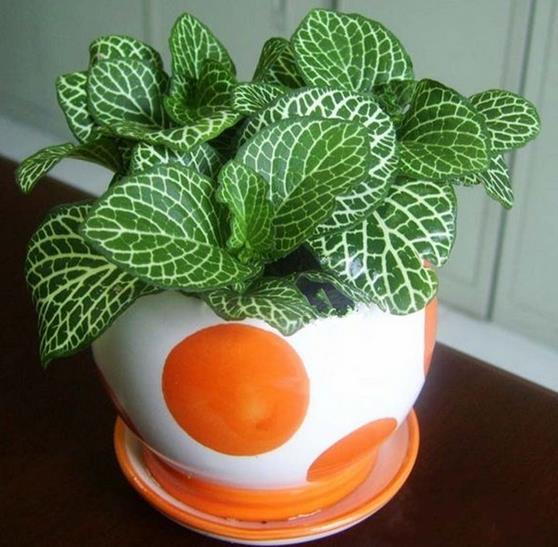Introduction and culture method of small plant reticulate grass in plaid shirt
The posture of reticulate grass is light, the plant is small and exquisite, and it is a small potted plant among foliage plants. Because the leaf vein is clear, the leaf color is light and elegant, and the texture is symmetrical, it is very popular in Europe and America. Let's take a look at the knowledge of reticulate grass.

First, the introduction of reticulate grass
Reticulate grass, also known as Feitong grass, red reticulate grass, is a plant of the genus Spicaceae. The leaves of reticulate grass are fresh and beautiful, which is especially suitable for potted plants. In fact, the history of reticulate grass is not long, since it was discovered in the 1940s, only half a century. So far, in Europe and the United States windowsill, balcony and bedroom has been very common, indicating that reticulate grass has a special charm. The leaves of reticulate grass are fresh and beautiful, which is especially suitable for potted plants. Use it to put hotels, shopping malls, airport lounges, shop windows, halls, regardless of single or piece furnishings, can play a better effect. Potted plants or hanging pots are used for bedroom decoration, putting desks, coffee tables or windowsills, green and delicate, light and soft, making people feel fresh and comfortable. Lobular reticulate grass in Europe and the United States is also often used to make bottle scenery or box scenery to watch, but also unique.
2. Cultivation techniques of reticulate grass

1. Matrix preparation
With loose, drained and ventilated imported peat of 5-40mm specification, break the peat with machine and mix well with water. (standard of adding water: after mixing well, hold a handful of peat tightly and the water seeps from the fingers) to be planted in a cup. The peat consumption in each basin of the 9cm basin is about 250ml, and a packet of 300L imported peat can hold about 1200 cups.
two。 Pot requirement
Select professional high-quality seedlings, seedling height 4-6cm, crown width 4-5cm, no diseases and insect pests, no withered leaves, no yellow leaves.
3. Upper basin
The old pots that are reused must be soaked in potassium permanganate 1000 times solution for more than half an hour, then rinsed with clean water and dried for use. Small potted plants are generally planted with 9cm size pots, first cushion the 2cm matrix at the bottom of the cup, and then move the sieve seedlings into the cup, the seedlings should not be planted too deep, and the base of the flat plant should be suitable; the medium is loose and tight, loading to the cup 8 minutes full, 1 ball / pot. When the seedlings are installed in the basin, first put a coarse-grained matrix or ceramsite 2cm thick at the bottom of the basin as a filter layer, sprinkle a layer of fully mature organic fertilizer as base fertilizer with a thickness of about 1cm to 2cm, and then cover it with a layer of matrix, which is about 1cm thick, and then put in the plant to separate the fertilizer from the root system and avoid burning roots. You can choose one of the following substrates for pots.
Vegetable garden soil: slag = 3RU 1; or garden soil: medium coarse river sand: sawdust = 4RU 1RU 2; or one of paddy soil, pond mud, rotten leaf soil. Or peat + perlite + ceramsite = 2 + 2 + 1; vegetable garden soil + slag = 3 + 1; peat + slag + ceramsite = 2 + 2 + 1; sawdust + vermiculite + medium coarse river sand = 2 + 2 + 1. After putting on the basin, pour water once and keep it in a shaded environment.

4. Humidity management
Like the humid climate, the relative temperature of the air in the growing environment is required to be 60-75%.
5. Temperature management
The optimum growth temperature is 18 ℃ ~ 30 ℃, avoid cold frost, keep the overwintering temperature above 10 ℃, enter dormancy when the temperature drops below 4 ℃ in winter, and die of frostbite if the ambient temperature is close to 0 ℃.
6. In summer
Air convection needs to be enhanced so that the temperature in the body can be released; it is recommended to put it in the semi-shade, or give it 50% shade; spray it properly, 2 or 3 times a day.
7. In winter
You need to move to a brightly lit place for maintenance; if you keep it outdoors, you can wrap it in film for the winter, but uncover the film every two days when the temperature is high at noon to let it breathe.
8. Fertilizer and water management
There are many requirements for fertilizer and water, but for fear of random fertilization, concentrated fertilizer and partial application of nitrogen, phosphorus and potassium, it is required to follow the fertilization (water) principle of "frequent application of light fertilizer, less and more times, and complete nutrition":
Spring, summer and autumn
These two seasons are its peak growing season. Fertilizer and water management circulates in the order of "Huabao"-- "Huabao"-- clear water-- "Huabao"-- "Huabao"-- "Huabao" at least twice a week. The interval period is about 1-4 days for outdoor maintenance, shorter intervals during sunny days or high temperatures, longer intervals or no watering during rainy days or low temperatures. For indoor maintenance for 2-6 days, the interval should be short in sunny or high temperature, long in rainy or low temperature, or not watered at all. Watering time should be arranged as early as possible when the temperature is low in the morning. Summer is watered in the morning or evening when the temperature is low, and plants are often sprayed.

9. Winter
During the dormant period in winter, the main task is to control fertilizer and water. Fertilizer and water management circulates according to the order of "Huabao"-clear water-clear water-"Huabao"-clear water-clear water, the interval period is about 7-10 days, the interval period should be shorter during sunny or high temperature, and the interval period should be longer or not watered during rainy or low temperature. Watering time is arranged as far as possible when the temperature is high at noon on a sunny day.
The above is the knowledge of reticulate grass. I hope I can help you.
9. Winter
During the dormant period in winter, the main task is to control fertilizer and water. Fertilizer and water management circulates according to the order of "Huabao"-clear water-clear water-"Huabao"-clear water-clear water, the interval period is about 7-10 days, the interval period should be shorter during sunny or high temperature, and the interval period should be longer or not watered during rainy or low temperature. Watering time is arranged as far as possible when the temperature is high at noon on a sunny day.
The above is the knowledge of reticulate grass. I hope I can help you.
- Prev

The best companion of tea garden Lu Binghua introduction and cultivation methods
The best companion of tea garden Lu Binghua introduction and cultivation methods
- Next

Introduction and breeding methods of Manzhu Shahua how to cultivate elegant and elegant Manzhu Shahua
Introduction and breeding methods of Manzhu Shahua how to cultivate elegant and elegant Manzhu Shahua
Related
- Wuhan Hospital Iron Tree Blooming Result Was Instantly Frightened by the Gardener Master
- Which variety of camellia is the most fragrant and best? Which one do you like best?
- What is the small blue coat, the breeding methods and matters needing attention of the succulent plant
- Dormancy time and maintenance management of succulent plants during dormancy
- Minas succulent how to raise, Minas succulent plant pictures
- What are the varieties of winter succulent plants
- How to raise succulent plants in twelve rolls? let's take a look at some experience of breeding twelve rolls.
- Attention should be paid to water control for succulent plants during dormant period (winter and summer)
- Watering experience of twelve rolls of succulent plants
- Techniques for fertilizing succulent plants. An article will let you know how to fertilize succulent plants.

